Not With A Bang But A Whimper.
When people get frightened, they very often turn to the right to give themselves reassurance, and that is why it has always happened in all great economic crises.”
Tony Benn.
I re-established contact with Jochen after reading a piece about his time in the slammer. It tallied with the account he had given me several decades earlier . After his maltreatment he had in good time found a job at an electronics factory. And a new country. The old polity in demise. On the brink of insolvency, the cumbersome sclerotic statist economy with fingers in it’s dike, the primacy of political decisions over any kind of economic necessity, ended up breaking the back of the state itself. It’s viability hugely dependent on it’s guarantor, the U.S.S.R., the G.D.R’s fiasco was above all economic .
The leadership had figured to solve their problem of unpopularity they had to catch up with the West industrially like the Soviets .
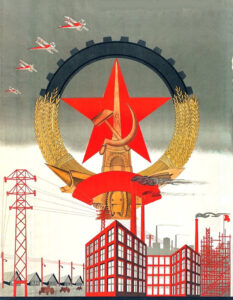
Instead, in disarray, they were swept away as the West looked on in amazement.
The collapse restated, in a dramatic form, the most neglected facet of political life, one spurned in east as much as in west, namely the capacity of the mass of the population to take sudden, rapid and novel political action after long periods of what appears to be indifference.
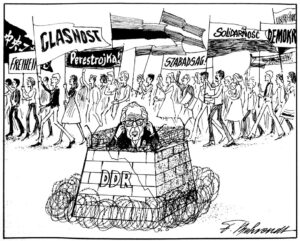
In a bid to improve the government’s image in the eyes of the public, Erich Honecker was forced to resign by the SED Politburo in October 1989. As he prepared to fly out of the country to Moscow his situation gave rise to one last joke. According to this he was asked if he was going to bid farewell to the people, to which he answered: ‘Why? Where are they going?’
In their speed, import and the uncertainties the mass actions unleashed, it could only be compared to a war. One in which all established expectations and plans are swept aside, in the face of novel and irrefutable realities.
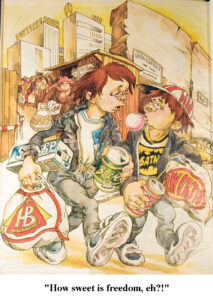
Trying to compete with the western state on its materialistic terms, The G.D.R. was a pale mediocre simulacrum. The costs of rebuffing the constant military threat from the West drained it’s coffers. The Communists played for time insisting that they were creating a happier world. The Soviet bloc had demonstrated that it wasn’t necessary for a country to have an owning class.
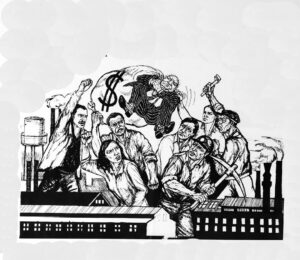
It could at least be said that the bloc, for all its obvious faults, was a bearer of ideas of social liberation and anti-colonial struggle.
As the Cold War swung in the direction of capitalism, taking on Chinese characteristics, as the cover up over Chernobyl drove the final nail into the Soviet coffin, cracks in the unbending, unregenerate hierarchical power structure widened. Imploding along the middle, the dominos tumbled.
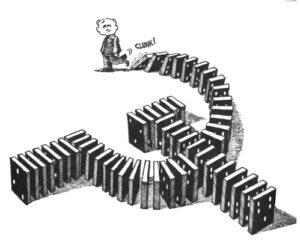
The ‘impregnable’ Wall, built out of desperation, a much maligned emblem of tyranny gladly seized upon by anti-Communists, came ingloriously tumbling down. Clumsily knighted the ‘anti-fascist protective rampart’ by the East German regime, this ultimately futile construction symbolized the failure of the untrusting Stalinist yes men in Eastern Europe to go beyond raising industrial production and maintaining high levels of employment.
It would delay western Capital’s constant chipping away at the Soviet bloc’s barriers.
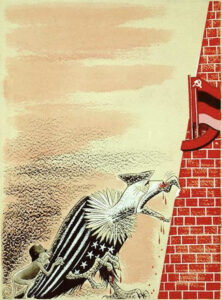
At the same time it would undermine the bloc’s moral legitimacy.
The regime failed to educate it’s people accurately of the reality of the ‘growth’ based buccaneer capitalist world they were about to be yanked into and deflowered by against their material interests, well beyond a joke.
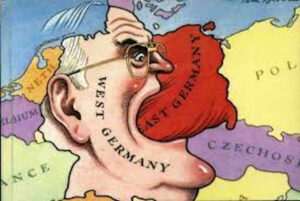
The people escaped from Inner Balkonia to Greater Balkonia. Not the fascist demon from the past which was patently not true, but one with a downside they would unwittingly contribute to.
The day was it’s. Dominated by gloating private interests, the social discipline of the market and wage slavery, it would throw the baby out with the bath water.
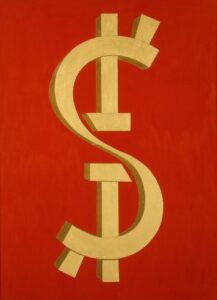
As Western consumer goods flood in after the collapse , Rita Vogt, the semi-fictional character of ‘The Legend of Rita’, visibly disgusted and horrified, lectures her colleagues about how they ‘will never have it this good again.’ After being resettled in the DDR from the Federal Republic, with a new identity as a working-class woman, she embraced the experience with all the passion and intelligence she once devoted to robbing banks and blowing up buildings in the West. Willing to live the kind of life she professed to believe in, ignoring her co-workers’ contempt for her opinion, Rita warns them of what they would lose: ‘Maybe you’ll never be better off than now and here. Here you cannot lose your job or be kicked out of your apartment. You don’t know what you’re going to miss out on. Maybe you’ll be able to afford decent trousers but not the arse in those trousers. This here was a great attempt at a revolution, despite all the crap you were part of it. It’s supposed to be a world that isn’t ruled by money. Why don’t you believe in that anymore. In yourselves anymore.’
As in the other parts of East Europe, many were expecting a cornucopia of abundance.
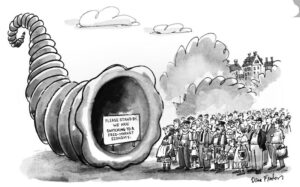
After the celebratory ecstasy of re-unification had ended there would be the counterblast of cold reality. All the glitter was still not gold. The unification was not between equals but between a poor, community-orientated, working-class society and a wealthy, middle-class society that prized self-improvement. This New World Order would come with growing inequality between rich and poor and the continued scourge and curse of poverty to the detriment of human dignity in the society in which we live.
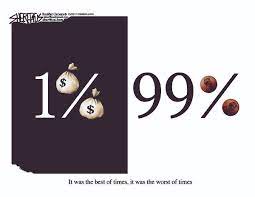
Where born again billionaires fill their pockets while hungry babies cry.
Where those with the money have got the whole world in their hands.
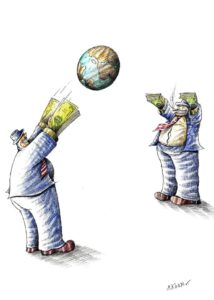
More would feel like us- lucky that they can withdraw from society, but also unlucky insofar as that same society cannot be changed into one from which we feel no need to withdraw.
Reunification would have its overlooked losers and victims of gentrification like Bruno in the film ‘Next Door’.
The common wealth of those joining our ranks would be expropriated under a different hammer, by the same get rich quick army occupying us.
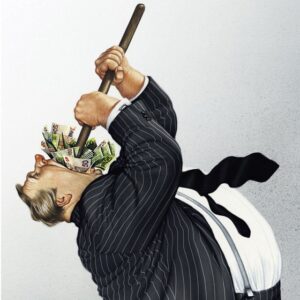
By a legion of lean, mean and ravenous takers, fakers and talkers, privatising profiteers, corporate clones, relocating asset strippers, neo-conning scammers, predatory hucksters, scavenging speculators, auctioneers, credit card company men and pharmaceutical lobbyists.
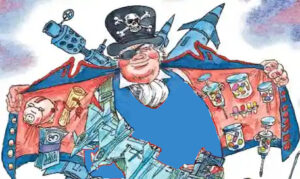
By bilking bankers, snake oil salesmen, real estate sharks, trophy home hunters and downsizing CEOs.
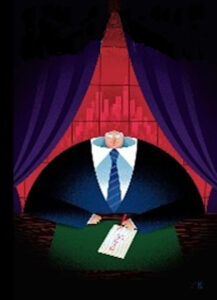
By outsourcing spivs.
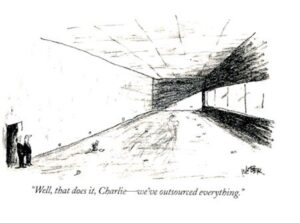 By would-be yuppies and outright gangsters that feed frenziedly everywhere else, reinforced by carpetbaggers, former black marketeers and turncoats flipping over as easily as a trout in a pan. By the same legions of vampires, making cut rate offers that couldn’t be refused, buying at marked down, fire-sale prices, making recovery all that more difficult. Going, going, gone!
By would-be yuppies and outright gangsters that feed frenziedly everywhere else, reinforced by carpetbaggers, former black marketeers and turncoats flipping over as easily as a trout in a pan. By the same legions of vampires, making cut rate offers that couldn’t be refused, buying at marked down, fire-sale prices, making recovery all that more difficult. Going, going, gone!
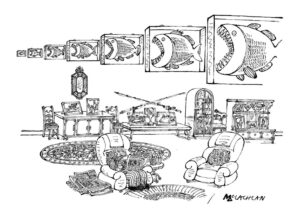
And the beat goes on. All for what? To Become part of a stuttering economy where for the few there are rich pickings and kickbacks where the givers say ‘Thank you’ and the recipients say ‘Don’t mention it’.
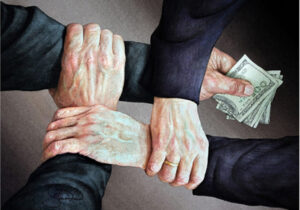
Where sport would be played not for sport’s sake or national pride but for advertisers to promote their brands.
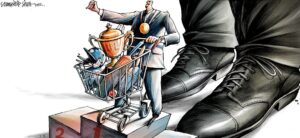
Where backs for others are kicked long enough, hard enough and low enough. Where they are offered massive unemployment.
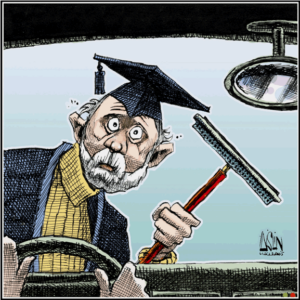
Where even with their degrees in hand they have to settle for whatever jobs they can find.

Where they are offered heightened rents, insatiable materialism, acquisitive individualism, whiter bread and sexier circuses. Greater freedom to shop. Greater freedom to shag. Greater choice. Designer lingerie to kick some life back into dead relationships. Cashmere and silk to make oneself feel what passes for happy.
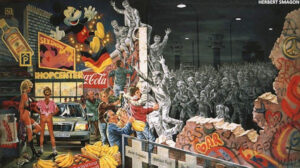
i phones made by a some woman who jumped out of a window in China stuck in the pocket of your jacket made in a Bangla Deshi firetrap.
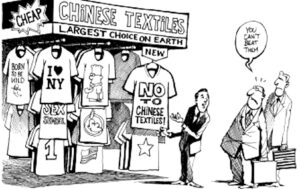
The same specious landscape as ours decorated by spanking smart emporia , gleaming merchandise, posters of trips to the Caribbean, bells, whistles and toys, but scarred by the rusted fag ends of long-shuttered, dismantled smoke stack industry, colossal tenement stonehenges and the deteriorating social and economic status of women.
East Germany granted women the right to work and equal pay in 1949, and later introduced benefits like a paid year of maternity leave and full-time state-funded child care. But those were ended after West German norms were adopted following reunification.
The emergent global village was one where town halls, shops, courts, police stations, post offices and local newspapers are closed or closing, stripping the place of every symbol of permanence, community strength and civic identity, and forcing the more able individuals to up sticks and get out.
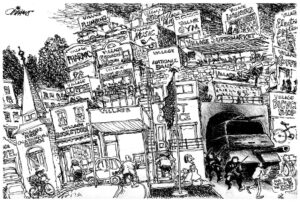
A new set of values and criteria. The emphasis on personal success rather than achieving a common goal shared with others. People forever distracted with possessions and trinkets and title.
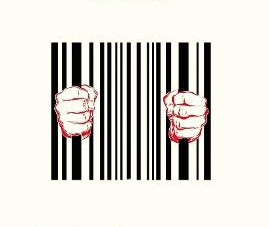
Becoming part of a military alliance whose dominant partner’s 1% of people have all the nation’s wealth, who get richer by having their their taxes cut and getting bailed out when they gamble and lose. Whose poor have their needs for for health care and education ignored. Whose media appears free but is controlled by a few persons and their families. A media which scares the people into supporting policies that are against their interests. Which can fill its prisons with particular racial groups with little complaint .
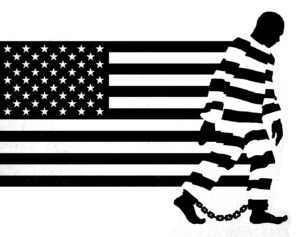
Which can wiretap phones.
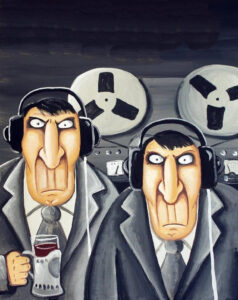
Which can torture foreign prisoners, rig elections, lie constantly about why it needs to go to war.
It’s not by chance that during moments of fear, social and economic crisis, people tend to gravitate towards militarists, dictators, strong men, who by despotically imposing the law, momentarily reassure the masses. The breakup of the command economies, particularly the Soviet Union and Yugoslavia would accelerate this tendency. In the former DDR, it would boost the appeal of the far right. It led to Germany becoming the second-biggest troop provider in the war against Afghanistan.
The writing is clearly on the wall. It’s in the form of a highly effective work of political street art in the heart of Berlin’s Alexanderplatz. Abstract, it is not. Rather it’s an urgent response to this modern era of continuous wars bolstered by a profitable war industry. The sentiment that roars across the top of this gleaming white modernist box is as timely right now as ever.
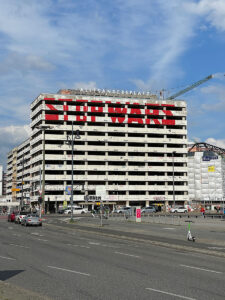
Another item of street commentary on the statue of Marx and Engels in Berlin declares them to be ‘Not Guilty.
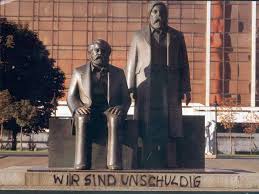
There were undoubtedly crimes carried out in their names. They had very little to do with that. It’s wholly wrong to blame them for what was done in their name, as it is to blame Jesus for what was done in his. Marx was a theoretician. He certainly called for revolutions, armed struggle and a “dictatorship of the proletariat”. But, one must not lose sight of the fact that Marx himself was persecuted in various European countries, and voting rights were very limited.
Marx was legitimately concerned with the horrendous working conditions of the Industrial Revolution in the 19th Century. In this regard, he may be compared to Dickens and other Victorians, who were passionately disturbed by child labour, 12-hour labour shifts, and so on. But, Marx’s intellectual contribution went beyond, inasmuch as he sought to analyse how economic relations work in capitalism.
The growing inequality that is shaping social life in industrialized nations today is a gigantic moral problem and has some devastating effects. Marx offered a necessary counterview in order to balance the abuses of capitalism.
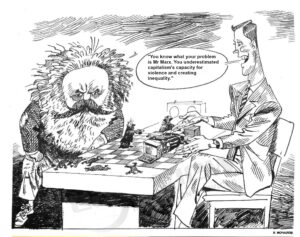
Still Rockin’ with Jochen
When Jochen and his wife, Hannelore made it to Sydney in 2010, I told them my favourite reunification joke. ‘ I say, I say, I say, did you hear the one about the Bavarian who meets a Saxon in an elevator? ‘
‘We are one, now,’ said the Wessi.’
‘ We are too’, replied the Ossi’.
‘There’s a lot of truth in that,’ said Jochen. ‘Nach die Wende,” or after ‘the changeover’, the economic division remains’, said Jochen.’ We were poorer than West Germans before we were officially divided in the late 1940s, and remain poorer today.
Many, especially of our generation, found themselves fighting to retain our homes, saw our university degrees belittled, saw our experiences tainted as “Socialist” and were too frequently shoved into the role of second-class citizens.’
‘What are you up to these days in the New Germany, Jochen?’
‘I work as a guide at the Hohenschönhausen Memorial. I speak about my experiences there as a prisoner. I talk to visitors about being interrogated in the very room where this was carried out.
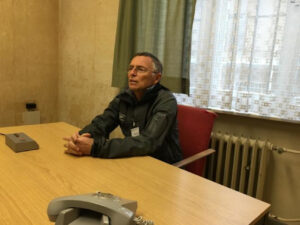
‘That must bring back some unpleasant memories.’
ʻTalking about it helps keep any of those at bay and gives me a strong sense of purpose. I remind people that no members of civil society should ever be treated like that. I consider my work at the Memorial as a contribution to the defence and protection of democracy.ʼ
‘What about cars in the new German landscape?’ I asked, switching gears to a lighter topic.
‘People are getting about in better cars of course. One newly rich burger was hit by another in a BMW while crossing a Potsdam street. A woman rushed to him and cradled his head in her lap, asking, ‘Are you comfortable?’
The man answered, ‘I’m making a nice living now.’’
‘Are people still getting around in their Trabis?’
‘Not so many.
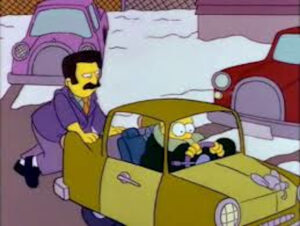
The ones that do get accessories for them. One of my neighbours converted his into a sports car.’
‘How did he do that?’
‘He keeps a pair of sneakers in the glove compartment. Another got a St. Christopher medal for his .’
‘He must feel heavenly assured now driving in his crate.’
‘Not at all. The silverware itself was all he could get in the exchange. Trabis are now practically worthless unless they have a full tank. He’s now saving for a second hand Opel from the West to hang it in.’
‘How do people generally feel about all this?’
There is a small number of parvenus receiving retail therapy who have gone on an orgy of conspicuous consumption , spending big to impress others. The story goes of one who told his friend : “ Look, I just bought this shirt for 3 thousand marks !”
“Idiot,’ replied his friend, ‘ I saw the same shirt for 5 thousand marks in a boutique round the corner!”

One mug revelling in his new found consumer sovereignty, keen to be parted with his money, could now pay to see a handwriting service. The expert quickly determined he was gullible and well-off just from a signature on a cheque.
‘On the other hand many people feel gazumped, feel that in this sea change the goods haven’t been delivered. Many realise now what ‘Nouvelle Cuisine’, roughly translated, means: ‘I can’t believe I paid ninety-six Euros and I’m still hungry.’
Mind you I’ve done well personally from this, the only game in town. So much so we’ve been able to enjoy such pursuits as sailing along the Croatian coast.’
I asked Jochen where he and Hannelore had met. ‘On the Baltic coast,’ he replied.
‘Ah ha,’ I tut tutted, ribbing him, taking on the role of the interrogator, ‘on Party business, I presume’.
‘Party business-how do you mean?’
‘You know perfectly well what Party I mean. The Party. The Cameroon Party.’ I hinted cheekily at the thought of these two young swinging beachcombers back in the 70’s, gathered on the sand dunes at night, letting it all hang out, daubing body parts with toothpaste and wearing African-style headgear.
They were indulging in a little “Freikoerperkultur” (“Free body culture”), the only voluntary mass movement of the old East. People couldn’t go to France and not to Italy, and so they went to the Baltic Sea or to a lake near Berlin and took off all their clothes and felt free. And NATO felt free to keep a close eye on them.
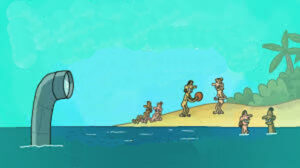
Germans famously reject any shame about nudity. One remembers how nude scenes in GDR movies appeared long before the first naked people appeared in Hollywood films.
‘Sorry to disappoint you, Herr Davis,’ he replied, playing along. ‘Although it’s true we wanted to see more of each other.’
‘Circumstantial evidence, Herr Scheidler,’ I insisted, eyeballing him intently, shining my torch in his eye, giving him the third degree, ‘Let me put it to you that you were sailing the Croatian coast scouting ostalgically for any remaining stretches of the former socialist world reserved for this decadent practice. ’
‘ I’m innocent he pleaded, ‘You’ve got nothing on me’’
‘You never had nothing on you’, I said, looking accusingly stern,’ Who did you make your travel arrangements through?
‘What do you mean?’, he replied, sounding a little peeved.
‘You know very well what I mean. It was through Ossi Urlaub, wasn’t it?’ I insisted, barely subduing my giggles, mentioning the travel agency handling no frills charter flights for nude Ossis .
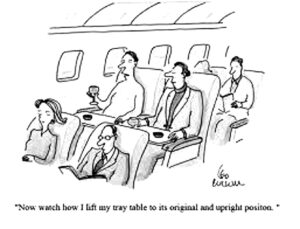
‘Why do you make these dumm allegations?’, he pleaded.
‘Go on, own up, you’re all seeking lebensraum.. Deep down you skinny dippers feel crowded out by the prudishness of ‘Wessis’ fencing off your stretches of unclad beach.
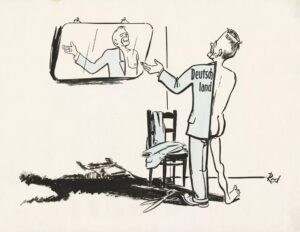
Please confess, don’t make us guess. It’ll go easer for you.’
‘All right, I’ll come clean,’ he said, tired of this grilling and being worked over. ‘I give up. They’ve hemmed us in, stripping us of our few remaining assets. What else can we poor spartan creatures of habit do? Wearing no clothes everyone is equal.’
That may well be true but don’t forget clothes make the man; naked people have little or no influence on society. So tell me more about your plane trip.’
After some air turbulence on our flight, the pilot assured us, ‘Ladies and gentlemen, You can shed all your fears now as well as your inhibitions. Everything’s going to be fine.’
Some say we’re unsuited for such travel but flying like this, our clothes don’t get creased. We don’t get stuck with those fellow passengers who get to you when they take out their wallets and start to show you pictures of their families, their house, their boat. To tell you their life stories. And the chances of a terrorist being on-board are reduced. Certainly no shoe-bomber!’
‘Yes, Jochen, people now have a lot of freedom to choose to fly anywhere and anyhow. With some provisos-suicide bombers, drone wars and deepening financial crises-there’s a lot to be said for the naked capitalism we all live under now. You can think of it as an airplane in which the pilot announces to his passengers that he has two pieces of news to tell them. The good news is that they are travelling at the pre-established speed of six hundred miles an hour and all the systems on the plane are functioning perfectly. The bad news is that they are lost.’
After one of their crowded days sightseeing in Sydney, I cross examined Jochen as to where they had been. ‘Watson’s Bay. Steep Cliffs. Fishermen’s cottages. Quiet beach and —. As his words trailed off, Jochen confirmed my sneaking suspicions.
‘ And—!?’
‘All Right. If you insist. Lady Jane Beach. Not that there were any ladies -he answered, informing me that this was now a favoured gay preserve- ‘Just every other Dick- Tom’s and Harry’s.’
Before departing, Jochen and Hannelore presented us with a book of quotidian images of the defunct G. D. R. Pride of place is a photo of a group of miners – lathering up together in the showers.
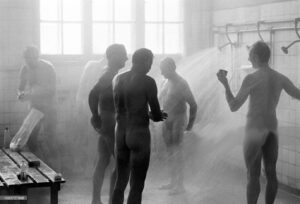
Such was the naked reality of these hardy Ossis. Doing everything together in the altogether.